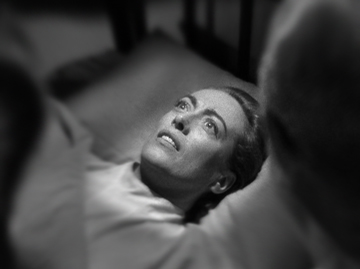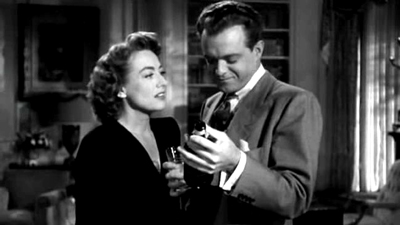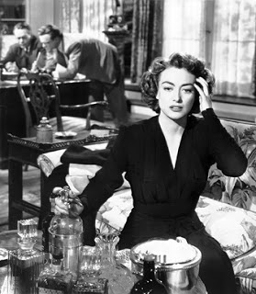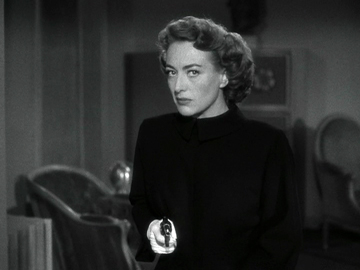
 |
|
|
|
The Warner Archive's newest and most welcome wrinkle has been the quiet but steady release of library Blu-rays, a mix of customer requests and new restorations that are most deserving of HD presentation. Joan Crawford remains a popular name for the fans of Old Hollywood still focused on movie star worship. She's already available on Blu-ray in The Women and What Ever Happened to Baby Jane?, so one would think the next logical choice for HD would be Crawford's biggest hit, Mildred Pierce. No, we instead get 1947's Possesed, a melodrama soaked in film noir, psychology and twisted attention-getting as only Ms. Crawford could concoct them. Make no mistake: the credited director is Curtis Bernhardt but the leading lady either dictated or signed off on every creative decision in the movie. At this career point, her contract gave her some authority and her driving personality claimed the rest. After winning the Oscar for Mildred Pierce, Crawford chose to revisit the kind of role she'd often been denied back at MGM. Possesed is a class-A item making maximum use of the studio's resources. The producer is Jerry Wald, Crawford's trusted collaborator on Pierce. A writer from that movie, Ranald MacDougall, is also back again. Crawford called most of the shots, but also showed considerable career loyalty to many of her co-workers. It doesn't hurt to mention that she routinely found bit parts for old character actors from as far back as her silent days. Monte Blue and Creighton Hale often appear in tiny parts. 
This is Crawford's second go at the title Possessed. The first was one of her poor-girl-hits-the-big-city numbers from the depths of the Depression at MGM. This Possessed is a slick psychoanalysis story, clearly made to get a piece of the noirish success that other actresses were finding in films about mental illness. An absurd melodrama, it can't make up its mind exactly why its leading lady is a nut case. Can romantic frustration be a direct cause of schizophrenia? The surprisingly downbeat opening may have been suggested by the recent memory of Ray Milland staggering down a New York avenue in Billy Wilder's ode to alcoholism, The Lost Weekend. Picked up delirious and disoriented in the pre-dawn downtown streets, a mystery woman is interviewed by her attending physicians. Her story unfolds in a series of flashbacks. A couple of years back ... she is Louise Howell (Crawford), a nurse in charge of Elizabeth, the sickly and unhappy wife of Dean Graham (Raymond Massey), a wealthy oil businessman. Louise is also having an affair with construction engineer David Sutton (Van Heflin), a vain playboy who tries to let her down softly when she thinks marriage is in the air. Instead, Louise's obsession for David expands to warp her view of reality. After Elizabeth accidentally drowns Louise stays on at the house to take care of Dean's young son. Dean also has a college-age daughter Carol (Geraldine Brooks) who suspects that Louise murdered Elizabeth to get her hands on Dean. When David persists in ignoring Louise, she does indeed marry Dean, although she doesn't love him. The relationship has its ups and downs until David re-enters the picture, whereupon Louise promptly goes bonkers. He takes a sudden interest in Carol, which causes Louise to have morbid hallucinations. Just how out-of-control is she? 
In Possessed Joan Crawford succumbs to that terrifying but glamorous malady known as 'movie psychosis' - the ruin of her personality (but not her looks) is the direct result of emotional pressure brought on by a failed love affair. Somebody did their homework on the details, as when Crawford's Louise Howell performs obsessive nervous tics like repeatedly clicking a cigarette lighter. But the film's view of mental sickness is still an awkward hoot. Picked up as a loony on the pre-dawn streets of Los Angeles, Louise is taken to the public County Hospital. A mysterious Jane Doe, she immediately receives the exclusive attention of a doting ace psychosis specialist. He spends what seems to be days on her case alone. The story Louise tells might well be a parody of the flashback convention in melodramas. Transitions are cued by visual associations, as when the water in a glass is equated with the 'black' water during a search for a drowning victim. The confused, brain-fogged Louise 'tells' her story in neat arranged dramatic acts, each with a soapy emotional cliffhanger. Louise 'remembers' several moments when she wasn't actually present, like private conversations between David and Dean, or David and Carol. The movie doesn't care about such trifles, or the fact that Louise's doctors don't contact the Graham family as soon as they learn her identity. We later find out that Louise has turned into a chronic liar and is not responsible for her actions. Wouldn't that make her entire flashback "testimony" suspicious and unreliable? 1 
This is one of the more popular Crawford titles, which has always amazed me. She seems more stiff and artificial than ever, and it's hard to distinguish when she's supposed to be bonkers and when she's simply trying to act unemotional. One thing the movie has going for it is fine camera direction. Although no specific unifying look is present, several special sequences display subjective camera tricks and other precise visual effects-oriented cinematographic gags. These may have been engineered by Robert Burks, who later became the camera ace for a run of great Alfred Hitchcock movies in the '50s. The most interesting trick sequence repeats an entire scene. Louise fantasizes a violent event occurring at the top of a staircase, but that scene is immediately followed by a 'real' (?) version of what happened. Again, Crawford's acting doesn't help clear up several issues, like how Elizabeth Graham really drowned. Although I've never heard it mentioned elsewhere, film noir fans might agree with me when I perceive Louise Howell Graham's story as practically identical to 'backstory' events in Billy Wilder's Double Indemnity. In that movie, Barbara Stanwyck was also the nurse for a sick woman who died in her care -- in a mountain cabin, as well. Stanwyck later married the husband, much to the distress of the woman's daughter. It is eventually revealed (or strongly implied) that Stanwyck murdered the wife as a first step to get the husband's money. 
Crawford's Louise Howell at one point thinks that she's done the same thing, but it turns out to be just another of her self-inflicted guilt trips. It is a little suspicious when both she and Dean Graham claim to not have a relationship, but later start one anyway. The amoral David Sutton also admits that he's indeed quite interested in the Graham fortune. An 'alternate read' of Possessed could easily have Crawford's character be just as diabolical as Barbara Stanwyck's, even to the degree of faking insanity to sidestep a sticky murder rap. Little Gerald Perreau plays Massey's young son; he's a dead ringer for his younger sister Janine, the creepy (and possessed) alien zombie girl from 1953's Invaders from Mars. The Warner Archive Collection Blu-ray of Possessed is a fine restoration of this handsomely-filmed "A" grade Warners noir. The early morning streets in downtown L.A. add a dash of realism to a film shot almost entirely on studio sets. We get an up-close look at a real Red Car! The higher resolution of HD reveals many painted mattes where we don't expect them, especially when 'tying together' shots in studio water tanks, with paintings of rocks and distant nighttime scenery. All previous image damage has been cleaned up, leaving the picture looking as it did in 1947. Franz Waxman's music makes a big impact; the Warner recording department was just getting into the period when their sound engineers designed really punchy, dynamic tracks. 
The extras recreate those on a DVD from 2005. Dr. Drew Casper's dramatic and emotional speaking style must be well known to students at the USC film school; his feature commentary discusses Possessed from all known angles. The featurette Possessed: A Quintessential Film Noir uses a number of writers and historians to sketch a superficial picture of the style. The dialogue bites from the participants are cut far too short to maintain a snappy pace. Experts like James Ursini and Dr. Casper are barely allowed to voice a complete thought. This steeplechase style was in vogue at several added-value editorial houses during the 'middle' DVD years 2002-2008. A trailer is included as well.
On a scale of Excellent, Good, Fair, and Poor,
Possesed Blu-ray rates:
Footnotes: 1. 'Subjective' flashbacks often create narrative problems. When a first-person flashback memory includes conversations that the flashback-ee didn't personally witness, we often say, "oh, she learned about that later." But that's not what we see on screen; the flashback is "lying". To be really faithful to the concept, what we see should only be what Louise saw. If she couldn't see another person's facial expression, we shouldn't be able to see it either.
The problem is that memories aren't really what happened to us in the past, they're mixed up with how we feel about what happened. We're constantly adjusting them for our mental convenience. So it's difficult to know what happened in a character's flashback, or whether any of them should be in any way reliable. This is one cinema-narrative problem that Alfred Hitchcock couldn't solve. When he tried to work with "lying flashbacks" in both Stage Fright and I Confess, audiences felt cheated. They saw what they saw, and what Hitchcock later revealed contradicted what they saw.

Reviews on the Savant main site have additional credits information and are often updated and annotated with reader input and graphics. T'was Ever Thus.
Review Staff | About DVD Talk | Newsletter Subscribe | Join DVD Talk Forum |
| ||||||||||||||||||